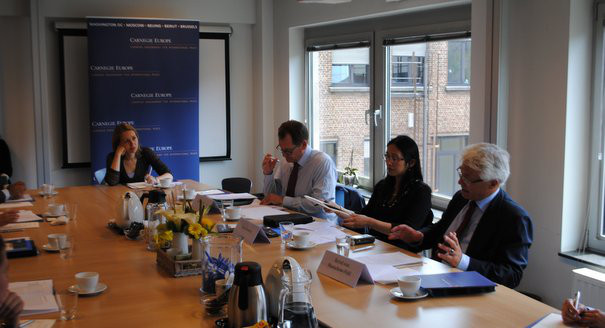Registration
Thank you!
You will receive an email confirming your registration.
IMGXYZ3835IMGZYXAs the global power balance continues to shift, India and the European Union seek to define their roles and strengthen their strategic partnership. Despite sharing broad political objectives and facing many common challenges, their relationship has performed well below its full potential.
Carnegie scholar Bernd von Muenchow-Pohl described the challenges and prospects of EU-India relations, as outlined in his latest paper, India and Europe in a Multipolar World, in a discussion with Sir Graham Watson MEP, chair of European Parliament Delegation for relations with India. Carnegie Europe’s Lizza Bomassi moderated.
Discussion Highlights
- Common Features and Values: Von Muenchow-Pohl explained that while India and the EU share common features—both have relatively young and evolving political structures as well as multiple languages, ethnicities, and religions—they also both face significant economic challenges. While India struggles with poverty and growing income inequality, the European Union faces difficulties with growth and competitiveness. Still, he added, both are economic powers who share the core values of democracy and diversity.
- Differing Approaches: Despite these similarities, differing approaches to the partnership have resulted in underperformance, von Muenchow-Pohl said. He described the EU approach of “effective multilateralism” as based on the idea that global challenges can only be tackled through multilateral cooperation. India, on the other hand, pursues “strategic autonomy”—engaging with everyone but aligning with no one.
- Challenges Facing the Partnership: According to von Muenchow-Pohl, the EU’s main obstacle is insufficient capabilities to implement its political objectives, while India lacks political will. Watson pointed out that while India is open to forming economic agreements with the European Union, it prefers bilateral ties with individual EU member states. Von Muenchow-Pohl added that each partner’s preoccupation with its own neighborhood translates into few shared interests and a general sense of apathy toward the relationship.
- The Way Forward: Von Muenchow-Pohl outlined steps that should be taken in order to reinvigorate the EU-India relationship:
- Since economics still form the backbone of the partnership—the European Union is India’s biggest trading partner and donor—both sides need to sign the free trade agreement that has been under negotiation since 2007.
- On the political side there must be joint action that goes beyond dialogue and identifies a few actionable items.
- Finally, the relationship is in need of more stakeholders, including lawmakers, business leaders, NGOs, and other areas of civil society. Watson agreed that exchange programs would further strengthen the relationship by creating cultural ties and enabling mutual understanding.
- Since economics still form the backbone of the partnership—the European Union is India’s biggest trading partner and donor—both sides need to sign the free trade agreement that has been under negotiation since 2007.
